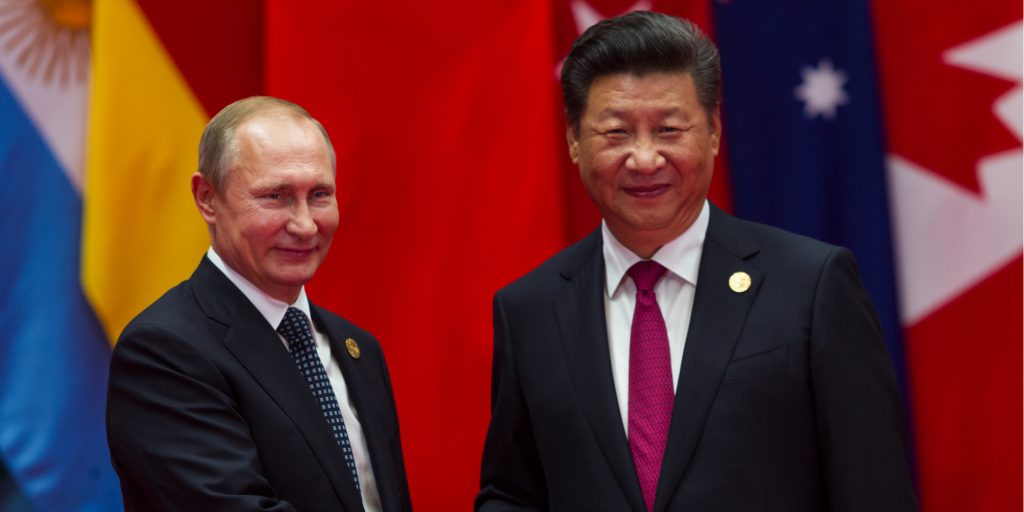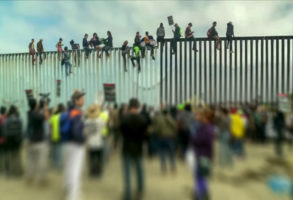
Published May 19, 2021
This piece is a response to the essay “Huntington and the Rebirth of International Identity Politics” by Samuel Gregg, also published by Law and Liberty.
It is important in our political and social moment to stay away from extremes. One extreme is the belief that the specific character traits and virtues that Western culture prizes actually represent universal values, ones that ought to be exported and adopted across the globe. This view “holds that peoples in all societies want to adopt Western values, institutions, and practices,” wrote Samuel Huntington in The Clash of Civilizations. The Western universalist attitude toward the world is to reshape it in its own image. Should the people of these nations resist, “if they seem not to have that desire and to be committed to their own traditional cultures,” he writes, they are said to be “victims of a false consciousness.”
The other extreme is a belief that a traditional culture can only stay strong and unique if it resists all influence from outside of itself. This is something Pope John Paul II warned about; while the content of each culture varies greatly, there is something universal in the human spirit that has the same basic needs “in the most disparate cultures,” but “the legitimate defense of uniqueness and originality,” should not be “confused with the idea that a particular cultural tradition should remain closed in its difference and affirm itself by opposing other traditions.”
Universal Questions, Particular Answers
There’s another error we must avoid: thinking that civilizations are monolithic—many accused Huntington of overlooking that reality; I think that criticism is valid but I can see why he needed to use a general rubric.
When we use the phrase “the clash of civilizations” most Americans think of ISIS or terrorist groups. Many tend to think in terms of war because of the word clash, and therefore think of how we can win against them. But to my mind, it is the word civilizations that dominates—that is consequential. This word has to do with our humanity. In every culture people ask the fundamental questions like: Who am I? What is my place in this world? Where do I belong? And other such questions. This is mankind’s quest for meaning.
These are universal questions, but their answers are particular, not universal. Every culture answers those universals in a particular way. So for instance, there will be some cultures that value the family as a whole more than they value the individual—like my Iraqi culture. Other cultures, like here in America, set more emphasis on the individual, viewing it as primary. That’s what the democratization of the family means after all, no? The problem comes when one civilization believes its answers to those universal questions are universal.
Cultures are meant to be dynamic; “They change and advance because people meet in new ways and share with each other their ways of life,” Pope John Paul II wrote in Fides et Ratio. They are “fed by the communication of values, and they survive and flourish insofar as they remain open to assimilating new experiences.” This is the both-and approach that stays clear of the two extremes.
Huntington tells his readers why the universality claim, or global order—or as others would say, the colonizing of non-Western nations through ideas—is not a good path: “Western belief in the universality of Western culture suffers three problems: it is false; it is immoral; and it is dangerous.” Cultural diversity, even if we don’t like it, he implies, is here to stay. However, “imperialism is the necessary logical consequence of universalism,” he wrote. If the West in general, and America in particular, should foist its ideas onto non-Western societies, it would have to destroy them and impose its way of life on them. But that is dangerous because in doing so “it could lead to a major inter-civilizational war between core states and it is dangerous to the West because it could lead to defeat of the West.” That would be a “boomerang effect of imperialism upon the homeland,” as Hannah Arendt wrote.
Looking at the political class, and American society at large, it is easy to see that “Iraq fatigue” has set in. I believe most Americans would rather not think further about the situation there for two reasons: 1) We were the aggressors, and 2) the plan had a boomerang effect, largely because they (most Iraqis) weren’t as interested and excited to adopt the values we were so eager to implant in them. Our dreams of the universality of striving for Enlightenment-era Liberty were dashed, and many can’t cope.
“Western civilization is valuable,” Huntington writes, “not because it is universal but because it is unique.” What makes it unique—as in singular, special—is not “in the way it has developed [e.g. via the Enlightenment] but its values and institutions.” It is the ensemble of “Christianity, pluralism, individualism, and rule of law.” These distinctive characteristics made modernity possible—it allowed the development of “individual liberty, political democracy, the rule of law, human rights, and cultural freedom.” These characteristics are unique to this civilization. Rather than attempting to reverse the decline of Western power, Huntington advises, the prudent thing is “to learn to navigate the shallows, endure the miseries, moderate its ventures, and safeguard its culture. . . . The principal responsibility of Western leaders, consequently, is not to attempt to reshape other civilizations in the image of the West, which is beyond their declining power, but to preserve, protect, and renew the unique qualities of Western civilizations.” Western leaders have not heeded his warning and advice.
In line with the thought of John Paul II, I would add that like all unique—as in particular—civilizations, the West has something to offer. But it also has many things to learn from the values and ideas of non-Western cultures. I find it infuriating that the default American cultural and political stance is: “we think your ideas and values are backward and obsolete but we’ll commodify your goods and make money off of them.” It’s what America has done with oil in the Middle East, gunpowder precursors across the Pacific islands, coffee and bananas in South and Central America, and a host of other goods. It’s what the British did with tea in Asia, and all of Europe did with precious minerals in Africa, and other such things. On a more familiar and immediate scale, we’ll take Mexico’s or Lebanon’s cuisine but not their religiosity or prioritization of multigenerational family structures. This attitude has been part of the history of Western civilization, and it was and is the hallmark of colonization. But it is anti-Christian and anti-pluralistic. It is a perversion, a deformation of a meaningful openness to other cultures. It is arrogant, materialistic, opportunistic, decidedly uncharitable.
In any confrontation between peoples, there are dual extreme tendencies for the different cultures to want to either dominate the other or to withdraw into themselves. It is very difficult to hew to the mean and stay true to one’s own identity while being open to the other.
A Western Anti-Culture?
In his essay on the 25th anniversary of Samuel Huntington’s The Clash of Civilizations, Samuel Gregg writes that,
Many Western-educated, young Middle-Eastern Islamic men [. . . ] had not become ‘just like us’ following exposure to Western societies characterized by liberal constitutionalism and market economies. Neither economic affluence nor the experience of bourgeois norms had mollified their views. If anything, their antipathy towards the West had grown.
Why? Because the difficulty of being open to people who do not share our cultural identity is compounded when that identity is an anti-identity, as it is in the West. What do I mean by this?
If there is a clash—and I believe there is, as I wrote in National Affairs—it is not between the Judeo-Christian West and Islam, the East versus the West, as Huntington and others have seen it. The clash is between all those who espouse a metaphysically informed view of the world and those who don’t. American religious conservatives in general continue to make the mistake of assuming that Western civilization is the Judeo-Christian civilization. It is not. It stopped being that a long time ago. Conflating the two keeps those who espouse a metaphysically rich reality from working together—whether that means with immigrants from these traditional cultures or with those abroad who share this view—to re-humanize a world that has been dehumanized by an anti-metaphysical material philosophy.
To be clear, I am not saying that Muslims qua Muslims are not in conflict with Christians qua Christians. But the macro conflict between the West and the rest—to use Huntington’s phrase—is between a secular materialist (note: not secular humanist) West and a religious East. (Parallel conflicts on a smaller scale echo within the civilization between the secular West and the remnant of the religious West.) It is between a West that has deconstructed family life and atomized to the extreme. It is a culture that celebrates rights without obligations. It is a culture that, as Cardinal Joseph Ratzinger wrote, “excludes God from the public conscience, [believing Him to be] irrelevant to public life.” Ratzinger continues, observing that the current culture in the West is the “radical contradiction not only of Christianity, but of the religious and moral traditions of humanity. . . . Muslims . . . do not feel threatened by our Christian moral foundations, but by the cynicism of a secularized culture that denies its own foundations.”
The secular anti-God West doesn’t stand a chance against non-Western nations that have strong religious and cultural traditions. “Where divinity is derided or else ignored, human sensitivity assumes a kind of absolute validity since man is hungry both for certainty and for safety,” wrote the poet Elizabeth Jennings in Every Changing Shape. Roots! A strong sense of place; belonging to a family, community, and culture; a pub where you are known, a restaurant that knows what you like, a church, mosque, or synagogue to which you belong—these and other such things are what give meaning, certainty, and safety to the human person. It is in this context that we see a human being act as a human being. “It is not possible to understand man on the basis of economics alone, nor to define him simply on the basis of class membership. Man is understood in a more complete way when he is situated within the sphere of culture through his language, history, and the position he takes toward the fundamental events of life, such as birth, love, work and death,” wrote Pope John Paul II in Centesimus Annus.
Market economies and bourgeois norms don’t feed the soul—if anything, they emaciate.
It seems to me—I could be misreading Gregg—that while recounting Huntington’s prediction that non-Western civilizations will re-exert their civilizations’ distinctiveness, he disapproves of and disparages the fact that these non-Western civilizations are reasserting themselves, that they “speak in civilizational terms.” But I would ask, why is the West allowed to—as Huntington suggested for it to do—”preserve, protect, and renew the unique qualities of its civilization,” but Russia, China, Turkey et al., cannot? Moreover, they are purposely thwarted and chastised when doing so? How is that a sign of liberty and tolerance, values that the West proudly claims as its own?
Even though he suggests exactly how the West can preserve its civilization, Huntington warns against arrogance:
These images of the West as arrogant, materialistic, repressive, brutal, and decadent are held not only by fundamentalist imams but also by those whom many in the West would consider their natural allies and supporters. Few books by Muslim authors published in the 1990s in the West received the praise given to Fatima Mernissi’s Islam and Democracy, generally hailed by Westerners as the courageous statement of a modern, liberal, female Muslim. The portrayal of the West in that volume, however, could hardly be less flattering. The West is “militaristic” and “imperialistic” and has “traumatized” other nations through “colonial terror” (pp. 3, 9). Individualism, the hallmark of Western culture, is “the source of all trouble” (p. 8). Western power is fearful. The West “alone decides if satellites will be used to educate Arabs or to drop bombs on them. . . . It crushes our potentialities and invades our lives with its imported products and televised movies that swamp the airwaves. . . . It is a power that crushes us, besieges our markets, and controls our merest resources, initiatives, and potentialities. That was how we perceived our situation, and the Gulf War turned our perception into certitude” (pp. 146-47).
Such views, Huntington reminds the reader, “are not the views of a bearded, hooded ayatollah.”
What the West has done and continues to do is hypocritical and unjust: the plundering, manipulating, and colonizing of the underdeveloped world by the developed world—of the poor by the rich. I am hardly the first to say so. The teaching of the Catholic Church has continually pointed out the unchristian behavior in this arena. In Leo XIII’s encyclical Rerum Novarum, in Pius XI’s encyclical Quadragesimo Anno, John XXIII’s Mater et Magistra, Pacem in Terris, and Gaudium et Spes, Paul VI’s Populorum Progressio and Octogesima Adveniens, John Paul II’s Sollicitudo Rei Socialis and Centesimus Annus, Benedict XVI’s Caritas in Veritate, Francis’ Laudato Si’ and Fratelli Tutti. I am not saying that other civilizations have clean hands, or that they do not act unjustly; I am saying that Western civilization cannot claim Christian values as its hallmark and act on the world stage using anti-Christian values. As the Christian Bible says: “Why do you see the speck that is in your brother’s eye, but do not notice the log that is in your own eye?” Insofar as the Christians in the West support this anti-Christian agenda, their hands are dirty as well. They should know better—they should neither submit to these ideas being the standard-bearer of their civilization, nor give their vote to those espousing them.
Civilization and Exile
In recounting the controversies surrounding Huntington’s book, Gregg mentions Edward W. Said, a cultural critic that came to prominence through his post-colonial writing. Said was enraged by Huntington’s argument and didn’t hesitate to say so—he was unsparing in his invective.
Said, that complex man who made an enemy out of almost all American conservatives, understood the agony of uprootedness and the injustices of colonialism at a gut level. But instead of addressing this metaphysical disconnect, instead of culling the good from this work, he goes after Huntington—he could only read him with hostility. He scatters rather than gathers. Said’s anger made him miss things on which he would have agreed with Huntington. Huntington wrote: “The unity of non-West and East-West dichotomy are myths created by the West. These myths suffer the defects of the Orientalism which Edward Said appropriately criticized for promoting ‘the difference between the familiar (Europe, the West, ‘us’) and the strange (the Orient, the East, ‘them’)’ and for assuming the inherent superiority of the former to the latter.”
If anyone understood the disorientation of a loss of identity, the anguish of being torn “from the nourishment of tradition, family and geography,” as he describes it in his essay on exile, it was Said, who knew acutely that “discontinuous state of being” that many of us experience. Given Said’s anti-imperialism, one would think he would be sympathetic to at least some of Huntington’s thoughts: the destruction of Western imperialism, Huntington’s recognition of Western arrogance and its double standards, and the West’s “devastating impact on every other civilization,” as Huntington wrote.
I suppose I’m a different type of exile than Said, and so I look at things differently—possibly because I didn’t have the privilege of a Princeton and Harvard education when I came to America, possibly because I am a woman, possibly because Said lived through the decolonization period whereas I came into the world after, and from a family who somewhat appreciated British colonial presence in Iraq (not because Britain was consciously sympathetic to the plight of Christians in Iraq—far from it. The British thought only of Britain, but exerted some salutary influence because of collateral goods.) What may possibly be the most defining difference between the two of us is that while Said was displaced from Palestine by the incoming Israeli state (which made him a deep opponent of the State of Israel), one could say that I was displaced from Iraq by Islam, by a society that made it difficult for Christians to feel at home in the land of their heritage. This is not to say that Christians and Muslims did not have friendships, or that all Muslims were against all Christians—no, it was more like a ubiquitous tension in the air. My parents were not cast out of Iraq, they left of their own volition, so I’m not technically an exile. And yet, Said’s writing on exile resonates—in spite of the many things we don’t share, I find a kinship there.
The uprootedness, the estrangement the exile experiences, is formative, and so too is its opposite: rootedness, belonging, and a sense of a strong identity. Surely, that is the first and primary lens with which we see the world—with which we understand such things as cultures and civilizations. It is a shame that Said could not, along with people such as myself, and to a certain extent Gregg, see that Huntington’s project included alerting the West to its own weaknesses and failings.
Luma Simms, a fellow at the Ethics and Public Policy Center, has written on the life and thought of immigrants for First Things, the Federalist, and many other publications.












